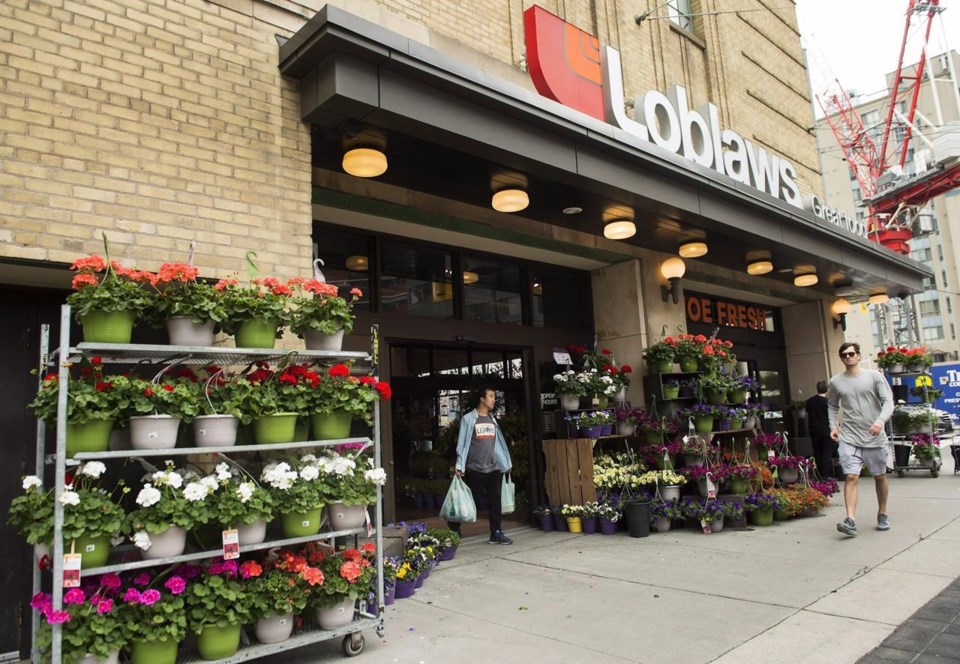Canada's largest grocer expects this year to be much like the last: customers continuing to seek discounts and deals, leading to more growth at the company’s discount brands and banners, and higher profits.
"We expect our retail business to grow earnings faster than sales, and adjusted earning- per-share growth in the high single digits," Loblaw Cos. Ltd. chief financial officer Richard Dufresne said.
The company saw its earnings and sales rise in the fourth quarter of 2023 and for the full financial year, as its discount stores such as No Frills outperformed other banners.
Dufresne told a conference call to discuss the company's latest results that Loblaw is gaining market share in the discount segment and holding its own against its peers in the rest of the grocery market.
"We're very happy with what's happening with our market share performance, specifically discount. And so that tells us that our strategies are working," he said.
The company has been expanding its discount footprint across the country, opening eight more Maxi and No Frills locations in its fourth quarter. It plans to keep that growth going in 2024, having announced a $2-billion capital investment plan earlier this week.
The expansion will result in more than 40 new discount stores, and also involves renovations, relocations and 140 new pharmacy care clinics — almost tripling its total pharmacy care footprint from the current 74.
"This is a new initiative. And we're actually quite thrilled with what it's doing for us," Dufresne said.
It was the first time that analysts on an earnings call heard from Per Bank, the new president and CEO of Loblaw. The European retail executive joined the company as former president Galen Weston stepped back from day-to-day operations, though Weston remains chairman of Loblaw and CEO of holding company George Weston Ltd.
Bank said he expects Canadians will continue to hunt for deals in three ways: responding more heavily to promotions; buying more house brands, especially No Name; and switching over to discount stores.
The company has carved out so-called hard discount stores Maxi and No Frills into a separate division, he said.
Loblaw said its investment plan will create more than 7,500 jobs in stores and in construction. The $2.2 billion in gross capital investments will be partly offset by about $400 million in proceeds from property sales, it said.
The company, which owns the Loblaws, Shoppers Drug Mart, No Frills, Real Canadian Superstore and T&T banners, has a network of 2,500 stores across the country.
Loblaw's results for the fourth quarter were better than expected, RBC Dominion Securities analyst Irene Nattel said in a note to clients.
In the fourth quarter of 2023, Loblaw said it earned a profit available to common shareholders of $541 million or $1.72 per diluted share for the quarter ended Dec. 30. The result compared with a profit of $529 million or $1.62 per diluted share in the last three months of 2022.
Revenue totalled $14.53 billion, up from $14.01 billion a year earlier.
On a same-store basis, food sales rose by 2.0 per cent, while drug sales increased 4.6 per cent, with front store sales growth of 1.7 per cent and pharmacy and health-care services sales growth of 8.0 per cent.
On an adjusted basis, Loblaw said it earned $2 per share in its latest quarter compared with an adjusted profit of $1.76 per share a year earlier.
Markets were expecting earnings per share of $1.90 as of Feb. 21, according to financial data firm Refinitiv.
The latest results come as Loblaw faces pressure from politicians and Canadian shoppers regarding inflation and the cost of groceries.
The company recently had to walk back a decision to reduce its discount on food items nearing their sell-by date after the move drew intense scrutiny.
Loblaw is also being urged by politicians to sign on to the grocery code of conduct, which it and Walmart Canada have said could raise prices.
This report by The Canadian Press was first published Feb. 22, 2024.
Companies in this story: (TSX:L)
Rosa Saba, The Canadian Press



